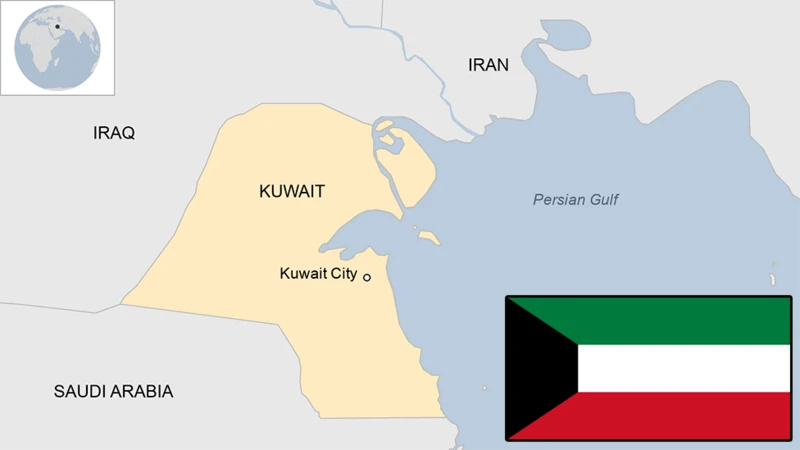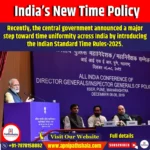Why in News?
India-Kuwait Relationship: India and Kuwait have taken a significant step in their bilateral relations, during Prime Minister Narendra Modi’s official visit to Kuwait on December 21-22, 2024. This visit has culminated in the formalisation of a strategic partnership, signifying deeper cooperation in trade, defence, energy, and cultural sectors.
Key Highlights of the Visit:
- Strategic Partnership Formalised: India and Kuwait elevated their bilateral ties to a “strategic partnership,” focusing on trade, technology, education, and defence cooperation.
- New Joint Working Groups (JWGs): Both countries agreed to establish JWGs in areas such as trade, defence, and technology to strengthen collaboration.
- defence MoU Signed: An agreement was signed to enhance defence ties through joint military exercises, maritime security collaboration, and defence equipment co-production.
- Counter-Terrorism and Cybersecurity: Both nations condemned terrorism in all forms and committed to disrupting terror financing networks and strengthening. cybersecurity cooperation.
- Energy Cooperation Expanded: Both sides agreed to move beyond traditional energy trade and collaborate on oil, gas, and renewable energy initiatives.
- Cultural Exchange Program Renewed: The 2025-2029 program was renewed to promote arts, literature, and cultural ties.
- Sports Cooperation Program Extended: A 2025-2028 agreement was signed to foster sports collaboration.
- Educational Collaboration Explored: Discussions included enhancing digital libraries and creating new EdTech platforms for shared learning.
- Kuwait’s ISA Membership: Kuwait joined the International Solar Alliance (ISA), signaling a commitment to solar energy development.
About Kuwait
Source: https://www.bbc.com/news/world-middle-east-14644252.amp
|
History of India-Kuwait Relationship
- Establishment of Diplomatic Relations: India and Kuwait established diplomatic ties in June 1962 with the appointment of Kuwait’s first ambassador to India. India was among the first countries to recognise Kuwait’s independence. Kuwait stood by India as one of the earliest supporters during its war with China in 1962.
- Tensions During the Gulf War: Relations faced challenges in the 1990s Gulf War when Iraq invaded Kuwait. India’s pro-Iraq stance and the relocation of its embassy from Kuwait City to Basra during the conflict strained ties. Incidents such as the Babri Masjid demolition in 1992 also affected India-Kuwait relations during that period.
- In 1992, Foreign Minister Madhavsinh Solanki’s visit to Kuwait was hailed as a “diplomatic victory”, helping to ease tensions.
- In 1994, the Kuwaiti government rejected a proposal in its National Assembly that sought to ban the entry and employment of Hindu workers, signaling an effort to maintain friendly ties with India.
- Over the years, India and Kuwait have maintained strong bilateral ties through regular high-level visits. From India, Vice President Dr. Zakir Hussain visited Kuwait in 1965, followed by Prime Minister Indira Gandhi in 1981 and Vice President Hamid Ansari in 2009. Similarly, Kuwait’s Crown Prince and Prime Minister Sheikh Sabah Al-Salem Al-Sabah visited India in 1964, while Amir Sheikh Sabah Al-Ahmad Al-Jaber Al-Sabah visited India in 2006. These visits have significantly contributed to strengthening the diplomatic and strategic partnership between the two nations.
Strategic Partnership between India and Kuwait:
The strategic partnership between India and Kuwait underscores the growing importance of their bilateral relationship, with deep significance for both nations across energy, economic, and geopolitical domains.
- Energy Security: Kuwait is one of India’s top suppliers of oil and LPG, playing a crucial role in ensuring the country’s energy security. As India remains heavily dependent on imports to meet its energy needs, a stable relationship with Kuwait is vital to maintain uninterrupted energy supplies.
- Economic Cooperation: Beyond energy, the economic partnership between the two nations is robust and diversified. Kuwait has emerged as a major investor in India, with its sovereign wealth fund actively involved in India’s infrastructure projects, as well as joint ventures in petrochemicals, fertilizers, and food processing.
- Geopolitical Stability: Kuwait’s strategic location in the Gulf region and its ability to mediate in regional disputes make it a key player in maintaining peace and stability in the Middle East. This aligns with India’s broader interests in the region, as a stable Gulf is critical for India’s trade, energy supply, and the welfare of its large expatriate population in the area.
Defence and Security Collaboration
India and Kuwait have steadily expanded their defence and security ties, focusing on naval cooperation, joint training, and intelligence sharing to enhance regional stability and counter threats.
- Naval Cooperation: Indian naval ships have made several port visits to Kuwait in recent years, signaling the growing importance of maritime ties. In July and October 2022, four Indian naval ships visited Kuwaiti ports. Notably, on August 19, 2023, the Indian Navy’s indigenously built destroyer INS Visakhapatnam docked at Al-Shuwaikh Port. This visit was preceded by earlier missions in 2021 when Indian naval ships transported liquid medical oxygen to Kuwait during the COVID-19 crisis. On August 14, 2023, Indian Ambassador Adarsh Swaika met with Kuwait’s Naval Chief, Brigadier General Hajjah Al-Alti, to discuss strengthening navy-to-navy collaboration.
- Joint Exercises and Training: India and Kuwait also conduct joint military exercises and training programs, aimed at enhancing interoperability and strengthening defence readiness. Such collaborations are crucial for addressing challenges like maritime security, counter-terrorism, and maintaining peace in the region. Exercises like PASSEX (held on August 22, 2023) with the Kuwaiti Navy underscore the commitment of both nations to fostering operational synergy.
Trade and Economic Relations
India and Kuwait share a strong and historically significant economic relationship, with trade forming a cornerstone of their bilateral ties.
- Historical Trade Relations: India has historically been a natural trading partner for Kuwait. After 1961, India has consistently ranked among Kuwait’s top trading partners. In 2011-12, bilateral trade grew by 44%, reaching $17.56 billion, with petroleum products forming the bulk of the trade.
- Indian Exports to Kuwait: Major exports included grains, organic chemicals, electrical machinery and equipment, vehicles, and ceramic products.
- Indian Imports from Kuwait: Key imports comprised mineral fuels, organic chemicals, aircraft and parts, plastics, and iron and steel scrap.
- Energy Collaboration: Energy remains a critical area of cooperation between the two nations. Kuwait is India’s sixth-largest supplier of crude oil and the fourth-largest supplier of LPG, highlighting its pivotal role in ensuring India’s energy security.
- Recent Trade Highlights: In the fiscal year 2023-24, bilateral trade reached $10.47 billion. Indian exports to Kuwait hit an all-time high of $2 billion, while Kuwait’s Investment Authority invested over $10 billion in India. This reflects growing mutual confidence and shared economic interests.
- Joint Initiatives: Several Joint Working Groups focusing on trade, investment, education, technology, agriculture, and culture have been established. These groups aim to identify and implement practical measures to strengthen cooperation in specific areas.
Cultural and Educational Exchanges
- Cultural Bonds: Historically, India and Kuwait have enjoyed close cultural ties, strengthened through frequent exchanges and interactions. Indian festivals, films, and cuisine are widely celebrated and appreciated in Kuwait, showcasing the influence of Indian culture on the local population. The Indian Embassy in Kuwait actively promotes India’s rich cultural heritage through various programs and initiatives.
- Educational Collaboration: The education sector is a significant area of cooperation between the two countries. There are 26 schools in Kuwait that follow the CBSE curriculum, catering to over 60,000 students, primarily Indian, along with a small number of Arab and South Asian expatriates. These institutions play a vital role in fostering ties through knowledge exchange and skill development.
- Research and Skill Development: India and Kuwait have also collaborated in areas like research and development, higher education, and skill enhancement. Joint ventures and training programs in technical fields are aimed at building capacities and enhancing educational cooperation.
Other Aspects of the India-Kuwait Relationship
- Healthcare Collaboration: Indian hospitals and healthcare professionals are highly sought after in Kuwait. During the COVID-19 pandemic, India provided essential medicines and medical equipment to Kuwait, including an emergency 15-member medical response team and initial medical supplies to aid Kuwait’s fight against the pandemic. This exchange of medical aid highlights the mutual support and solidarity between the two nations in times of need.
- Labor and Workforce Cooperation: Labor relations form a critical pillar of the India-Kuwait relationship. Indians constitute the largest expatriate community in Kuwait, comprising both skilled professionals and blue-collar workers. A Joint Working Group (JWG) on labor, employment, and workforce development regularly discusses issues related to manpower and worker welfare, ensuring smooth coordination and resolving challenges.
Explore our Books: https://apnipathshala.com/product-category/books/
Explore Our test Series: https://tests.apnipathshala.com/










